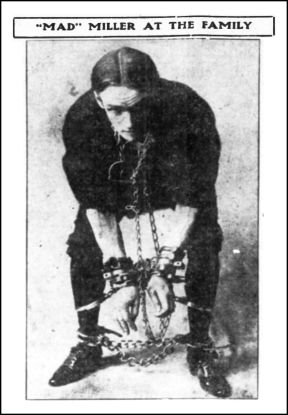|
Leon Gerald Reeves (1882–1927) was a self-promoting
fellow who used the Iroquois Theater tragedy as an
opportunity to portray himself as a hero and,
presumably, to make a quick buck selling a story to
a newspaper. The Sun put
the story, with all its inaccuracies, on the AP
wire, and it was picked up by a half dozen
newspapers where it can be found today, muddying
history.
Alone or with assistance from an actual reporter,
Reeves sold a story to The Sun, an NYC newspaper, in
which he claimed to be an employee in the
advertising department at the Iroquois and described
his actions at the fire as if he were a superhero
who ran from one area of the theater to another,
saving people left and right.
Because I did find him working as a bill poster /
flyposter in later years, it seems plausible that he
did bill posting for the Iroquois Chicago, providing
the gram of truth behind his claim to be an
employee. That said, his name was not included in a
list of Iroquois employees provided to authorities
by Iroquois business manager Thomas
Noonan.
Significant by its absence is Leon's name in Chicago
newspapers relative to the fire or later legal
proceedings. Was his perception of his heroics at
the Iroquois Theater accurate, could it have gone
unnoticed by dozens of reporters at the scene? When
Chicago newspapers saw The
Sun's story on the AP wire, wouldn't they have sought out
such an extraordinary man for an interview? Wouldn't
he have been called as a witness at one of the
inquests? Perhaps Chicagoans then read the story and knew it was more malarky than fact.
Five years after the fire, a seventeen-year-old girl
ran into the Harrison St. police department and
reported she'd been attacked. Nothing was reported
as to the nature of the attack, presumably because
words like sex and rape would have shocked 1908
readers. She said Reeves had lured her into the
balcony at the Trocadero Theater with promises of an
acting career, then stuffed her mouth with a
handkerchief to suppress her screams. He was
arrested and refused to give the police a statement.
Nothing more was reported about the incident.
Leon's next gambit was
claiming to have been Harris Houdini's manager
while promoting Handcuff King Miller. That was
followed by a stint of bill posting for Barnum and
Bailey circus. While working as a lifeguard at the
Wilson Avenue beach on Lake Michigan between 1914 and 1917, he rescued a
half dozen female swimmers and boaters.
|

|
In 1925 he sold 189 $3 seats to a stag show
featuring five strippers and a pianist (Vera Long)
at the National Theatrical Club (4th floor in K.P.
Building at 180 W. Washington). Police busted in and
arrested all. It was the first and only mention in
Chicago papers of such a club. Also, the only story
about the raid.
He was the youngest of thirteen children born to
Indiana natives Margaret Bennett Reeves and George
W. Reeves. He lived with his mother until her death
seven years before his own. On his WWI draft card,
he was described as stout of build and of average
height, with brown hair.
|
|

Mad Miller first turned up on vaudeville stages in 1908, in Illinois. Like
Houdini, he was dubbed the
handcuff King.
His association with Leon Reeves seems to have begun and ended the following
year.
Leonard J. Miller (1875-1941) performed as Mad Miller until 1919, then
retired to operate a grocery store and serve as postmaster in Wolf Lake, a
small town on the western edge of Michigan. In the last year of his stage
career, he ventured outside the Midwest to California and Oregon.
The only evidence of the association between Miller and Reeves were
advertisements that heavily promoted Reeves, too. I found zero evidence to
support con man Reeve's claim of having been Houdini's manager.
Miller was one of many Houdini copycats.
Walter H. Council (1876–?)
I failed to learn much about Walter. He married Doris Lenz in 1900 and in 1902 was
arrested for forging tickets from the
Illinois Theater (that was also owned/managed by owner of Iroquois Theater,
Will J. Davis), presumably to scalp.
|
|
Discrepancies and addendum
*
Read an entertaining story about young men learning the
trade of advance men, bill posters, lithographers,
and the like.A news blurb about the advance railway car for one
circus in 1924 reported the car served twenty-five
bill posters and advertising men. Early in his
career, Iroquois Theater manager
Will J. Davis worked as an advance agent for theater legend
Jack Haverly and, in that capacity, met and married his wife,
Jessie Bartlett.
|
